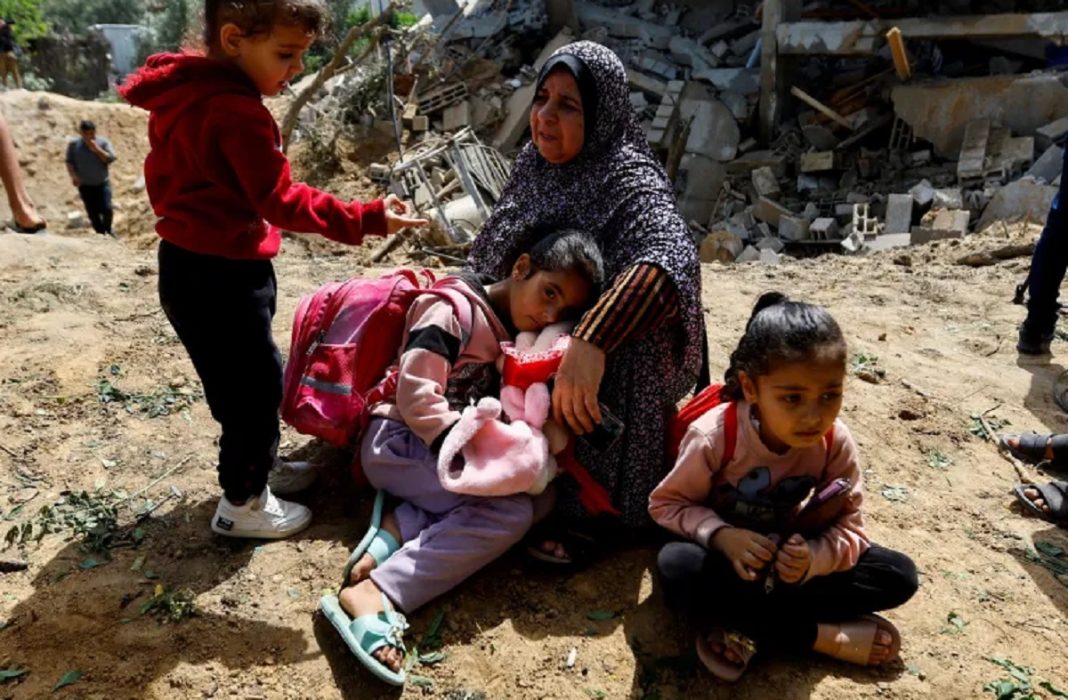The Ministry of Social Development in the besieged coastal enclave has announced that 784 people have been internally displaced.
The latest round of Israeli air raids destroyed 15 residential blocks, containing more than 50 apartments, the Gaza interior ministry has reported. In addition, 940 buildings have been damaged, 49 beyond repair.
Eyad al-Bozom, spokesman for the interior ministry, has rejected the Israeli allegation that they make every feasible measure to mitigate harm to civilians as much as possible, saying they meant to “justify their crimes against innocent civilians”.
“We stress that the residential blocks destroyed by the occupation were inhabited by civilians. Allegations by the occupation that these houses contained military targets are false and incorrect,” al-Bozom added.
The Ministry of Social Development also said that 94 families, comprising 535 people, have had their sources of livelihood affected by the Israeli shelling.
Families who have lost their only source of income include owners of stalls, day labourers, and the owners of shops that were destroyed, among others.
Gaza already suffers from a 60 percent poverty rate and a 44 percent unemployment rate.
In a statement, the ministry announced it has provided more than $26,000 worth of financial and humanitarian assistance to 268 affected families across the Gaza Strip.
The Palestinian Energy and Natural Resources Authority in the Gaza Strip has also warned that the state of the energy sector was dire due to the Israeli offensive – now in its fifth day.
“The ongoing situation portends an imminent humanitarian catastrophe, in light of the closure of crossings, and the cessation of the entry of fuel needed to operate the power plant,” the authority said in a statement.
“The only power plant in the strip does not produce the required energy due to the blockade imposed 16 years ago. The plant will now be forced to shut down because of the lack of fuel, which will lead to a deterioration in the humanitarian situation,” the authority added.
The supply of fuel has been on halt since Tuesday, when Israeli authorities shut down the only commercial crossing of Karem Abu Salem, known as Kerem Shalom to Israelis with the Gaza Strip, in conjunction with the continuing attack against the coastal enclave.
Israeli authorities continue to prevent the entry of trucks of goods, basic materials, medicines and fuel to the sole power plant, which is threatened to stop by tomorrow Sunday.
The Israeli authorities also continue to close the Beit Hanoun/Erez crossing to individuals, especially humanitarian cases, patients and workers.
“The current reality portends a humanitarian catastrophe at all levels and on vital sectors such as the health sector, the cessation of medical services that need a continuous source of electricity without interruption, and the services provided to citizens such as water, electricity, sewage treatment, and others,” the authority announced.
Israel has ruled out an immediate truce in Gaza, saying the onus was on Palestinian armed groups to stop launching rockets from an arsenal it suggested could be depleted within days, while its aircraft kept up attacks in the enclave.
“We’re not holding ceasefire talks,” National Security Advisor Tzachi Hanegbi told a municipal event near Jerusalem, adding that Israel’s top priority was presently firing on fighters.
On its side, Islamic Jihad’s armed wing stressed it would press on with rocket salvoes as fighting continues.
“The resistance prepared itself for months of confrontation,” it announced in a statement.
Palestinian Prime Minister Mohammad Shtayyeh has called on the United Nations to urgently intervene to stop the Israeli assaults on the Gaza Strip and the West Bank.
In a statement released by the government news agency Wafa, Shtayyeh also called for activating international laws to boycott Israel for its crimes against humanity, and not to allow the perpetrators to go unpunished.
The prime minister said the crimes committed by the Israeli occupation forces this morning in Balata refugee camp, east of Nablus, and the continuing aggression on the Gaza Strip are an extension to the killing and displacement policies against Palestinians during the Nakba in 1948, whose 75th anniversary is currently being observed.
Nabil Abu Rudeineh, the official spokesman for the presidency, has stated that Israel and the United States are responsible for the deterioration of security in the occupied territories.
Abu Rudeineh held the Israeli government responsible for serious crimes committed across the Palestinian territories, which, he warned, will have repercussions on the stability of the entire region.
He added that the US administration also bears responsibility for remaining silent about Israeli crimes and for its failure to immediately intervene.
At least 33 Palestinians, including children, have been killed and 150 wounded in the besieged enclave since the bombardment started on Tuesday. In retaliation, at least 1,000 rockets have been fired from the besieged enclave towards the occupied territories. Two Israelis have died in rocket attacks.
